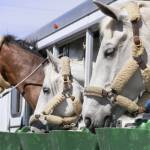Land or Air Travel for Horses: How Stressful Is It?

A study led by Hajime Ohmura of the Japan Racing Association examined stress in horses traveling by land or air, using heart rate as an indicator of stress.
Heart rate was measured in six Warmblood horses during a 24-hour quarantine before travel; a trailer ride lasting 4.5 hours; a 5-hour waiting period; and an 11-hour flight. The researchers also recorded heart rate variations, defined as the increases and decreases in heart rate during each period, noting that higher heart rates during the first hour of a trailer ride gave way to slower rates as the horses seemed to settle into the experience.
Despite appearing to be calm throughout the flight, the horses indicated by their elevated heart rates that they felt a higher level of stress than when they were resting in stalls. James Jones, who participated in the study, said stress was detected throughout travel, though the level was not constant.
Horses react to many things in their environment—noise, motion, unfamiliar surroundings, handlers that are different from those known to the horse, changes in feed or water, an unusual schedule—and it may be difficult to determine the exact contribution of each element to the horse’s level of stress.








